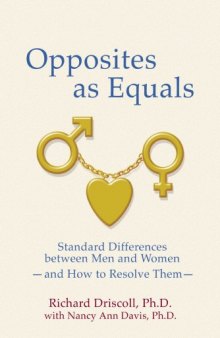 جزییات کتاب
جزییات کتاب
Current research shows vast differences between the sexes that are not going away. In Opposites as Equals husband and wife psychologists Richard Driscoll, Ph.D., and Nancy Ann Davis, Ph.D. explore gender, patriarchy, chivalry, the battle of the sexes, conflict resolution, modern equality, and the benefits of marriage. Men are seen to be considerably more intrigued by casual sex and are often opportunists, but try to conceal it. Women are more easily offended and are more insistent in arguments, while insisting that it is not so. Men are more highly stressed and confused in conflict with women, but consider themselves inadequate rather than merely normal. Men tend to concede, placate, or withdraw in arguments, which women misinterpret as indifference. Insistence is a viable genetic tactic for women, to command a commitment, whereas avoiding conflict can be a safety play for men, to avoid offending the women who might carry their genes into the next generation. A woman who gets upset wants a man to stay involved and talk it out with her, instead of vanishing, while a man wants a woman to control her emotions and not be so upset. Nature seems to program women to be more comfortable with confrontations, while appearing more troubled, and to program men to be more highly stressed, while appearing as confident as possible. Equality matters, and relationships are best when men and women participate about equally. As men withdraw amid confrontations, relationships turn emotionally barren or are permanently broken. The authors suggest that men might be more forthright about their experiences and stay involved, while women might soften their anger to level the playing field. Dual standards continue everywhere, although idealists expect us to treat men and women the same. Even the familiar double standard applies only among family and friends, while for outsiders it reverses itself. You are more accepting of an unknown woman who partakes of casual relations with your brother, but quicker to condemn the unknown man who takes casual advantage of your sister. We struggle to protect women against bad men, while we expect men to take care of themselves. And we expect men to compensate women for sexual favors, while it is improper to acknowledge it and most of us would be readily offended by the mere suggestion. The authors caution that we can no longer afford to so misunderstand our opposites. Each misunderstanding is a potential troublemaker, lurking in the shadows, ready to trip us up or send us chasing after another rainbow. Relationships between men and women are becoming briefer, more narcissistic, and increasingly bitter. One in three women are found to strongly resent men, while one in six men strongly resent women. Complaints about men are now commonplace, and it is easy to conclude that the battle of the sexes is tilting against men. Four in 10 American children are born to single women, and the traditional family has become an alternative lifestyle. Once we see what we ordinarily overlook, we can plan ahead and program in the brighter futures we would wish to see. We will find the answers behind the masquerades, amidst the real men and women we ought to recognize as ourselves. Note: The You Still Don't Understand title shown in several of the following reviews refers to the 1st edition of Opposites as Equals. The text for the 1st and 2nd editions is the same.



 دانلود کتاب
دانلود کتاب

 جزییات کتاب
جزییات کتاب





 این کتاب رو مطالعه کردید؟ نظر شما چیست؟
این کتاب رو مطالعه کردید؟ نظر شما چیست؟
